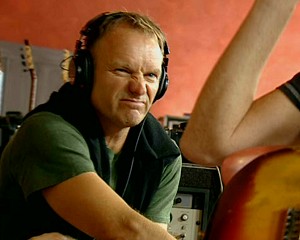
Sting

(note the similarity of this picture to another character of sorts)
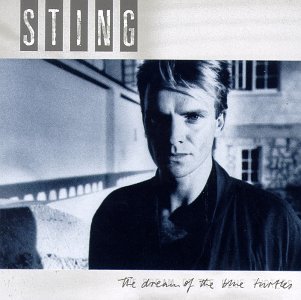
The Dream of the Blue Turtles (1985)
1) If You Love Somebody Set Them Free, 2) Love Is the Seventh Wave, 3) Russians, 4) Children's Crusade, 5) Shadows In the Rain, 6) We Work the Black Seam, 7) Consider Me Gone, 8) The Dream of the Blue Turtles, 9)Moon Over Bourbon Street, 10) Fortress Around My Heart
Sting's debut solo record, following his the 1983 break-up of the Police, also happens to be my favorite of all his albums. Returning to his jazz roots, he decided to create a band containing many of the great American black jazz musicians of the time. The Blue Turtles, as the group would come to be known, was made up by Kenny Kirkland on the keyboards, Darryl Jones on the bass, Branford Marsalis on the saxophone, Omar Hakim on the drums, and Sting on vocals and the guitar. On the record, there are also backup vocals from Dollete McDonald and Janic Pendarvis, who went on tour with the Blue Turtles.
The reason that this is my favorite Sting album is chiefly because of the unique sound of the Blue Turtles. This record was always intended to be a pop/rock 'n roll album with a jazzy feel to it, but the music is unlike anything that's ever been made before (or at least that I've heard). The songs are all based around solid chord progressions just like most rock music, but the instrumental solos are ridiculous, especially the live versions on Bring on the Night, which I will review next. The musicianship is ridiculous, and I think reaches a zenith in the remake of the old Police track "Shadows In the Rain." Hakim's drums open the track (over someone shouting "Wait, wait! What key is it in?!"), joined with Sting's voice for the first lines of the verse; after two lines Jones, Kirkland, and Marsalis all join in full force. After the first chorus, Kirkland gives a great 45-second keyboard solo; after antoher few lines of chorus, Marsalis lets loose on his own sax solo. Needless to say, it's quite an improvement over the Zenyatta Mondatta version of the song. Also among my favorites are "If You Love Somebody Set Them Free" (mostly because of the backing harmonies), "Fortress Around My Heart," the instrumental title track, and "Russians" (a lyrical commentary of the Cold War; Sting sings over an old Sergei Prokofiev music line). An interesting sidenote: to the embarrassment of Sting, the album was nominated for a Grammy in the Best Jazz Album category; the award was given to Branford's brother, Wynton Marsalis, another excellent brass player. (Updated: 1/15/2004)
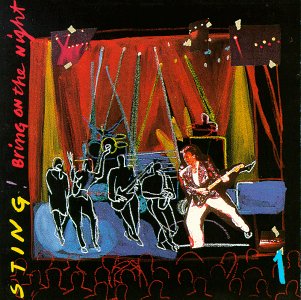
Bring On the Night (live recording) (1986)
Disc 1: 1) Bring on the Night/When the World Is Running Down You Make the Best of What's Still Around, 2) Consider Me Gone, 3) Low Life, 4) We Work the Black Seam, 5) Driven to Tears, 6) The Dream of the Blue Turtles/Demolition Man
Disc 2: 1) One World (Not Three)/Love Is the Seventh Wave, 2) Moon Over Bourbon Street, 3) I Burn For You, 4) Another Day, 5) Children's Crusade, 6) Down So Long, 7) Tea In the Sahara
This record was the first and only official live release by Sting and the Blue Turtles; it was also more than enough to demonstrate the group's amazing performance chemistry. The group performs a variety of tracks from The Dream of the Blue Turtles (though many excellent tracks are missing, most notably "If You Love Somebody...," "Shadows In the Rain," and "Fortress Around Your Heart") and also some old Police numbers. Also, instead of releasing an entire single concert, the album is more a compilation of what the group felt were the most memorable performances of each of their songs.
Disc 1 opens with a medley of the title track (a Police number originally released on Regatta de Blanc) and "When the World..." (another Police track that originally appears on Zenyatta Mondatta). The track opens with the original Andy Summer's classical guitar riff, joined with Darryl Jones's bass, and then Sting's astounding vocals. The real jazz signature on the record is made after the group sigues into "When the World..." with a 2-minute Kenny Kirkland keyboard solo. One of the coolest moments in the 11 minutes of the song is Branford's rap towards the end. The performances of "Consider Me Gone" "We Work the Black Seam" are pretty close to their record versions. "Driven to Tears" (to be continued)
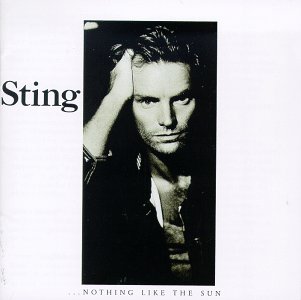
Nothing Like the Sun (1987)
1) The Lazurus Heart, 2) Be Still My Beating Heart, 3) Englishman In New York, 4) History Will Teach Us Nothing, 5) They Dance Alone (Cueca Solo), 6) Fragile, 7) We'll Be Together, 8) Straight to My Heart, 9) Rock Steady, 10) Sister Moon, 11) Little Wing, 12) The Secret Marriage
Sting's second record release still includes a lot of the unique sound that made Blue Turtles so incredible, though he ditched a lot of the jazz flavor in favor of some different sounds. In terms of the musician lineup, several things have changed, most notably the absence of Darryl Jones on bass and Omar Hakim on drums. Sting has dropped the guitar (for the most part) and moves back to his traditional bass role; instead of picking up a standard guitar player, there are a lot of guest guitarists on the record, most notably Eric Clapton (more on that later). Now on drums is Manu Katché. Kirkland and Marsalis are still on the record, thank god. In terms of genre, I'd say that this record is more stylically diverse than Blue Turtles. Lots of straightforward rock and upbeat funky stuff, though there are softer sounds as well (and again, not really any completely jazzy songs).
"Lazarus Heart" is a good opener, most notably due to guest guitarist and former Police member Andy Summers. It's a more straight rock track, with predictable drums and bass, but still a good song. "Be Still..." is the other Summers guitar track and has a softer sound. "Englishman in New York" is nice three-chord verse piece and is also probably the jazziest song on the album; I especially like the walking-bass middle-eight with Marsalis's solo sax (though there's a weird little drum solo closing that section that doesn't make any sense... oh well). "History..." is one of the funky tracks (Sting plays both guitar and bass) is one of those "we're bad people and we need to do better" songs. "They Dance Alone" features far too many guitar players: Clapton, Fareed Haque, and Mark Knopfler. The song is about how females cope with the oppression of then-Chilean-dictator Pinochet. Oh course everyone's heard "Fragile," on which Sting plays guitar and bass; Sting's mother had passed away around this time, and the lyrics are about her. Then there's "We'll Be Together," which is my favorite track... and probably the biggest attempt at Sting trying to be black. Actually, Sting has gone on record saying that he hates this song because he views it as his sell-out track. Since I never gave a damn about the Eighties musically (for the most part), I don't have any personal knowledge about the sell-out trend he is referring to; I actually like the song a lot, but mostly because of the harmony vocals and Kirkland's keyboard tricks. "Rock Steady" is another fun funky track. Also, and it wasn't until later that I found this out, "Little Wing" is a Jimi Hendrix Experience cover with an interesting interpretation: featured on the recording is the Gil Evans orchestra. I never thought anyone could play a Hendrix song like that, but somehow he pulls it off. (Updated: 1/24/2004)
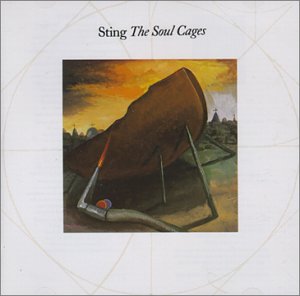
The Soul Cages (1991)
1) Island of Souls, 2) All This Time, 3) Mad About You, 4) Jeremiah Blues (Part 1), 5) Why Should I Cry For You, 6) St. Agnes and the Burning Train, 7) The Wild, Wild Sea, 8) The Soul Cages, 9) When the Angels Fall
In my mind, The Soul Cages marked Sting's major break from his solo jazz sound, though that's not necessarily a completely bad thing. His third record release was a more personal recording for him because of the death of his parents (though his maternal grieving is supposedly shown more on Nothing Like the Sun). The recurring musical image of the album is the sea, and I'd have to say it's carried off in a very brilliant, thoughtful way. The Soul Cages marks the joining of Dominic Miller on guitars, a position he holds to the current day. The standard players are Katché on drums, Kirkland on keyboards (and drums? This is noted on the Barnes and Noble review online), and Marsalis on saxophone; however, their influences are not nearly as present as the first two albums because of the chosen sound of the record. Also present on keyboards is David Sancious, who I suspect played the majority of that instrument on the record.
"Island of Souls" is a good representation of the mellow kind of sea imagery that the album deals with. Kathryn Tickell opens the track with Irish pipes and then is joined with some classical guitar strums courtesy of Dominic Miller, Sting's bass and vocals, and (Sancious's?) synth strings. Around 2:30 Katché comes in with a steady drum beat along with what I consider to be Miller's signature guitar sound: a heavily chorused series of open guitar arpeggios. The song closes with Tickell on pipes. (okay, I wrote a lot on that one song... I think I'll start a new paragraph and not write nearly so much)
"All This Time" also deals a little with the sea, but it's one of the more upbeat tracks. One can hear a louder example of what I mean by Miller's signature guitar sound around 0:45. In "Mad About You," Sting tells the Bible story of King David who sent a general of his army into battle so that he could have his wife when he was killed. The song centers around a nice acoustic guitar riff and the synth strings; also is a nice sax outro by Marsalis. The heavier rock songs on the record are "Jeremiah Blues" and the title track, the latter of which features a cool rock organ, and both of which have lots of cool Miller rock guitar. "Why Should I Cry For You" is the the song has most obviously to do with Sting's father. Finally "The Wild Wild Sea" has the most vivid sea imagery and also some wave sound effects. (Updated: 1/25/2004)
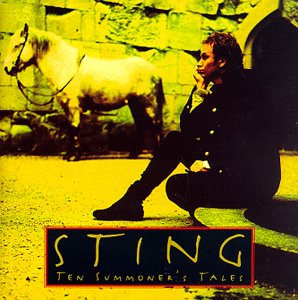
Ten Summoner's Tales (1993)
1) If I Ever Lose My Faith In You, 2) Love Is Stronger Than Justice (The Munificent Seven), 3) Fields of Gold, 4) Heavy Cloud No Rain, 5) She's Too Good For Me, 6) Seven Days, 7) Saint Augustine In Hell, 8) It's Probably Me, 9) Shape of My Heart, 10) Something the Boy Said, 11) Epilogue (Nothing 'Bout Me)
Sting's fourth release is also probably his most famous and was the record that perked my interest in his music. I actually remember the first time I listened to him quite vividly: I was in San Francisco with my family and we stayed overnight with some distant relatives of ours, who also happened to be hippies. So when we ate dinner with them Michael (the husband of the couple) said "And for music, we'll have Mr. Sting" and that was when I fell in love with "If I Ever Lose My Faith In You" and "Fields of Gold."
The biggest musician change-up on Summoner's Tales is the replacement of Katché with Vinnie Colaiuta on drums and Kirkland with David Sancious on keyboards (though both artists would return in some effect on later efforts). Also, Branford's nowhere to be found! How the hell did that happen?
"If I Ever Lose My Faith In You" opens the record with a flattened fifth chord, which has an interesting story attached to it: apparently, that chord was banned by the Catholic Church because of its "disconcerting" sound. Sting's first country-sounding song "Love Is Stronger Than Justice" is the second track on the album, though it is played in the non-traditional 7/8 time (and doesn't suck ass, like the other country songs Sting will produce later). His chorus vocal harmonies are excellent, as usual, and the lap steel guitar sounds more appropriate than sickening. Next is "Fields of Gold," the other major single from this record and one of Sting's most famous tracks. It includes lots of mellow keyboard music from Sancious and a nice classical guitar solo by Miller. "Heavy Cloud No Rain" is one of the more interesting tracks, with a sort of funk backbeat and some cool distorted slide guitar. Also featured in the song is one of my very favorite Sting vocal compositions: following the guitar solo, the song goes silent for an instant, and then Sting bursts in singing 'Heavy cloud but.. no rain' in three-part harmony with himself, which is continued with a cool middle-eight, before another round of the verse and a cool funky outro. "She's Too Good For Me" is one of Sting's few very straight-forward rock songs. To the chagrin of his record label, he added a string quartet section right in the middle of the track and refused to take it out even when they claimed the change could qualify the song as a single. Next up is "Seven Days," one of my favorite numbers on the album; it has a very smooth verse, even with its 5/4 time with some cool stacatto string parts. In "Saint Augustine In Hell" I think Sting is basically making fun of the Catholic church, and nothing beats that little monologue in the middle by David Foxxe as the Devil. "It's Probably Me" is a nice mellow track and an alternate version featuring Eric Clapton on guitar was included on the Lethal Weapons III soundtrack. The last two songs "Something the Boy Said" and "Nothing 'Bout Me" (doesn't get better than Miller's wah-wah guitar) are probably my favorite on the whole album, but since I'm tired of writing about this album, you can listen to it and find out for yourself. (Updated: 2/14/2004) 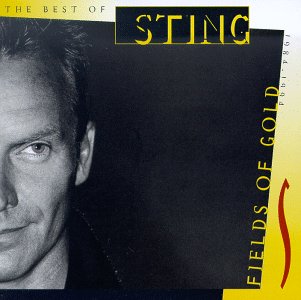
Fields of Gold: The Best of Sting 1984-1994
1) When We Dance, 2) If You Love Somebody Set Them Free, 3) Fields of Gold, 4) All This Time, 5) Fortress Around Your Heart, 6) Be Still My Beating Heart, 7) They Dance Alone (Cueca Solo), 8) If I Ever Lose My Faith In You, 9) Fragile, 10) Why Should I Cry For You, 11) Englishman In New York, 12) We'll Be Together, 13) Russians, 14) This Cowboy Song
Though I repeat this in later sections, I'm not usually a very big fan of compliation albums. As may be more evident in my reviewing of individual albums, I feel that for the most part artists intend for their audience to hear music in the context of the album format, and so putting together all the greatest hits (which, I might add, is very objective) that context is lost. Also, I think it's dumb when a greatest hits album is released for a particular artist or group before the band breaks up or before the artist dies or decides not to make music anymore (obviously this album only includes Sting's main works up to Ten Summoner's Tales). Otherwise, they end up making more albums and in most cases end up having more hits. I bought this album because I thought the alternate version of "We'll Be Together" and the fusion of Blue Turtles and Nothing Like the Sun tracks would be worth the 3 bucks I'd end up spending for it on E-Bay.
Also, I think it's retarded when extra tracks are put on a greatest hits album, because they're not necessarily very good and so they end up being completely out of place among the good songs that the artist has written. This is true on Fields of Gold because the extra songs aren't really anything special. "When We Dance" is a nice ballad, though I like the version on All This Time better. "This Cowboy Song" is okay, but again not very good. The only really cool thing about the album is the alternate version of "We'll Be Together" which has less of a dance/funk sound and more a rock sound, primarily because Eric Clapton plays lead guitar on this version. Other than that, this record is just a testament to the fact that record labels shouldn't be allowed to make compliation albums unless the artist expressly says to do so (don't even get me started on the Best of Sting and the Police CD). (Updated: 2/9/2004) 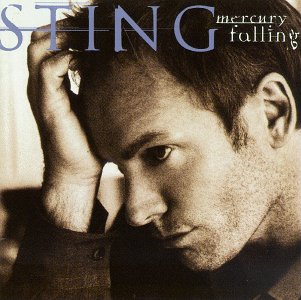
Mercury Falling (1996)
1) The Hounds of Winter, 2) I Hung My Head, 3) Let Your Soul Be Your Pilot, 4) I Was Brought to My Senses, 5) You Still Touch Me, 6) I'm So Happy I Can't Stop Crying, 7) All Four Seasons, 8) La Belle Dame Sans Regrets, 9) Valparaiso, 10) Lithium Sunset
In an interview, Kenny Kirkland said that Mercury Falling was the first album that Sting truly stopping caring what genre his songs fell into, which is a statement I'm very willing to agree with. I'm inclined to say that I don't like this album very much, but that's not necessarily true because there are parts of songs that I really really like.
As implied earlier, Kenny Kirkland rejoins the band on this record, although Katché is still absent on drums (Vinnie Colaiuta continues the job). Thankfully, Branford is back in action, although to much less of a degree than he was before. Something I thought was interesting is that in the liner notes the group is presented as a quartet: Sting (vocals/bass), Miller (guitars), Kirkland (keyboards, and Colaitu (drums), with the other musicians written in as guests. Kathryn Tickell makes her third appearance on pipes and fiddle (she was in the last two albums).
This paragraph is going to be on the songs and song sections that I enjoy, and the next section will list my dislikes. Mercury Falling appropriately opens with one of my favorite Sting songs of all time, "The Hounds of Winter." Though I still haven't figured out what the hell the hounds of winter really are (snowflakes? arguments?), I quite like Kirklands organ effects along with Miller's guitar and Sting's cries during the chorus. "Let Your Soul Be Your Pilot" reminds me mostly of gospel, though (thankfully) there's no nonsensical Baptist yelps of "Amen!" or "Say it loud, brotha!" or anything like that. The chorus harmonies of Sting and his female back-up singers is very moving along with the conclusive rock digression. "I Was Brought to My Senses" has another beautiful collection of chorus vocal harmonies, and also perhaps my favorite Branford saxophone solo of all time. Also, beyond all reason, I really like the whole of "La Belle Dame Sans Regrets," the lyrics of which are all in French. Sting's voice just sounds excellent, as always, and there's a simple but satisfying 1-minute Kirkland piano solo.
And I think that was about all I enjoyed. "I Hung My Head" features an interesting 9/8 time signature, but I'm kind of put off by the subject (some kid accidentally shoots some moron with his brother Jeb's rifle, and then gets hung for it) and the same two stupid guitar riffs are played the whole damn time. "Let Your Soul..." is fine, but at a length 6:43 the songs is too freaking long: perhaps if they'd made the verses shorter and less boring I wouldn't be complaining. "You Still Touch Me" is the first of three country songs, and put simply I don't like country music. I admit that I kind of like the lap steel guitar, but I prefer the kind that David Gilmour plays on Pink Floyd's "One of These Days " (overdriven like hell). "I'm So Happy I Can't Stop Crying" is another crappy country song. "All Four Seasons" features some ska chords and a cheesy brass section, so blah. "Valparaiso" features some Tickell pipes, but is quite drony and just not very good. Finally, "Lithium Sunset" is the third crappy country song. Don't get me wrong: I respect it when artists want to break from their usual sound and play something completely different. It takes a lot of guts to try something new, even when you realize it's a style you enjoy more than your popular sounds. I just don't like it, end of story. (Updated: 2/15/2004) 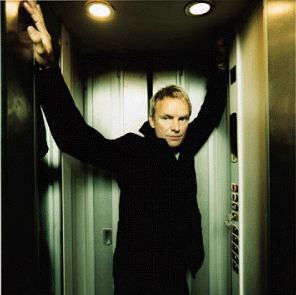
Brand New Day (1999)
1) A Thousand Years, 2) Desert Rose, 3) Big Lie Small World, 4) After the Rain Has Fallen, 5) Perfect Love... Gone Wrong, 6) Tomorrow We'll See, 7) Prelude to the End of the Game, 8) Fill Her Up, 9) Ghost Story, 10) Brand New Day
Though Sting chooses yet another motiff for his music, I found Brand New Day to be much more satisfying than Mercury Falling. The album is not without its downsides and I will never be completely satisfied with a new Sting release until a Blue Turtles or Police reunion (though the former can never truly occur, due to Kenny Kirkland's unfortunate drug-related death in 1998). Nevertheless, Sting pulled this album off by successfully pulling out a Middle Eastern influence out of his ever-expanding bag of musical tricks.
With Kirkland gone (and David Sancious nowhere in sight), Kipper tries his hand at the keyboards (as well as replacing Hugh Padgham as second-in-command to Sting's producing). Also, Jason Rebello becomes a regular on the piano along with Chris Botti on the trumpet. Both Katché and Colaiuta share in drums, and in addition, Branford is on the record with a clarinet instead of a sax (featured on the track "Tomorrow We'll See").
The album begins beautifully with "A Thousand Years," marked by a faded-in wall of ambient synth, joined by an alternating two-note keyboard riff. Sting's vocals are brilliant, especially carried by the harmonies of his backing singers. "Desert Rose" features Arab vocalist Cheb Mambi amidst Middle Eastern style strings and some electronic additions; the song was one of the biggest singles of 1999. "Big Lie, Small World" mimics the unique 9/8 time of "I Hung My Head" from the last album, but with good music. The track is carried by some nice classical guitar chords care of Dominic Miller, and an excellent chorus of harmony vocals and wonderful trumpet from Chris Botti. "After the Rain Has Fallen" probably includes the largest amount of electronic sounds and also has some Middle Eastern flavors; the chorus is probably my favorite of the entire record. "Perfect Love... Gone Wrong" features the strangest of all the vocal flavors on the album: several section of French rap by vocalist Sté. Except for the crappy French, the song is quite good. "Tomorrow We'll See" violates my rule of one song about a prostitute per artist (but is excused by Marsalis's superb clarinet solo; I get sick of "Roxanne" anyway). Luckily, only one country song is present on the album, "Fill Her Up," and includes the pleasant surprise of James Taylor as a guest vocalist. Finally, the title track features about a half-minute synth/guitar introduction which gives way to a smooth rock sound that probably would have appeared more at home on Ten Summoner's Tales (but thank god it's on this album). (Updated: 2/15/2004) 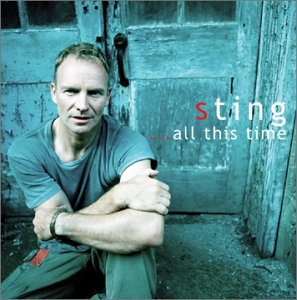
...All This Time (live recording) (2001)
1) Fragile, 2) A Thousand Years, 3) Perfect Love... Gone Wrong, 4) All This Time, 5) The Hounds of Winter, 6) Don't Stand So Close to Me, 7) When We Dance, 8) Dienda, 9) Roxanne, 10) If You Love Somebody Set Them Free, 11) Brand New Day, 12) Fields of Gold, 13) Moon Over Bourbon Street, 14) If I Ever Lose My Faith In You, 15) Every Breath You Take
This concert was planned as a pleasant jazz concert for friends and family at Sting's home in Italy. The date for the concert, however, was planned as September 11th, 2001, the same day as the World Trade Center terrorist attacks in New York City. When the somber crowds assembled in his home,
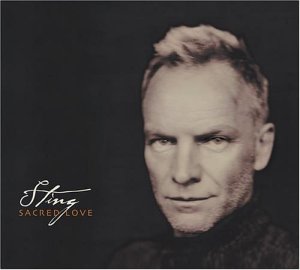
Sacred Love (2003)
1) Inside, 2) Send Your Love, 3) Whenever I Say Your Name, 4) Dead Man's Rope, 5) Never Coming Home, 6) Like a Beautiful Smile, 7) Let's Forget About the Future, 8) This War, 9) The Book of My Life, 10) Sacred Love (remix)
I really don't have a lot to say about this album because I don't like it very much.